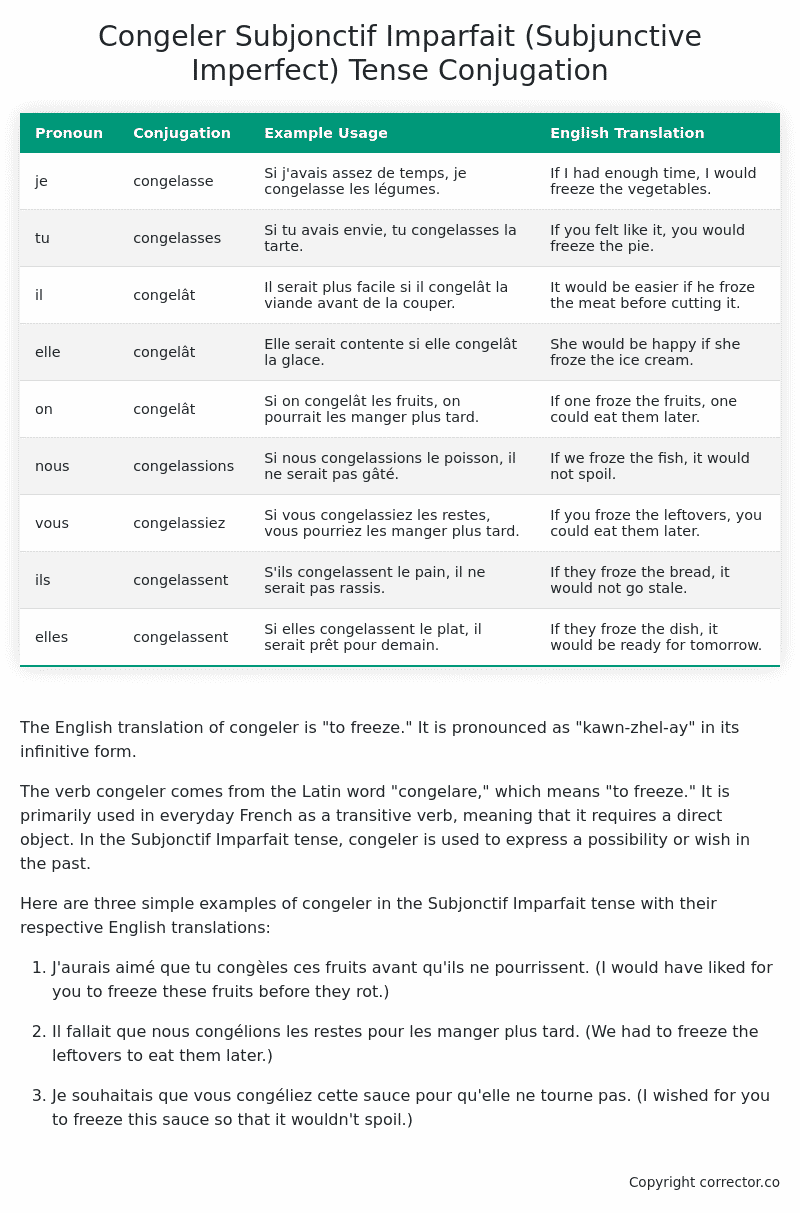Subjonctif Imparfait (Subjunctive Imperfect) Tense Conjugation of the French Verb congeler
Introduction to the verb congeler
The English translation of congeler is “to freeze.” It is pronounced as “kawn-zhel-ay” in its infinitive form.
The verb congeler comes from the Latin word “congelare,” which means “to freeze.” It is primarily used in everyday French as a transitive verb, meaning that it requires a direct object. In the Subjonctif Imparfait tense, congeler is used to express a possibility or wish in the past.
Here are three simple examples of congeler in the Subjonctif Imparfait tense with their respective English translations:
-
J’aurais aimé que tu congèles ces fruits avant qu’ils ne pourrissent. (I would have liked for you to freeze these fruits before they rot.)
-
Il fallait que nous congélions les restes pour les manger plus tard. (We had to freeze the leftovers to eat them later.)
-
Je souhaitais que vous congéliez cette sauce pour qu’elle ne tourne pas. (I wished for you to freeze this sauce so that it wouldn’t spoil.)
Table of the Subjonctif Imparfait (Subjunctive Imperfect) Tense Conjugation of congeler
| Pronoun | Conjugation | Example Usage | English Translation |
|---|---|---|---|
| je | congelasse | Si j’avais assez de temps, je congelasse les légumes. | If I had enough time, I would freeze the vegetables. |
| tu | congelasses | Si tu avais envie, tu congelasses la tarte. | If you felt like it, you would freeze the pie. |
| il | congelât | Il serait plus facile si il congelât la viande avant de la couper. | It would be easier if he froze the meat before cutting it. |
| elle | congelât | Elle serait contente si elle congelât la glace. | She would be happy if she froze the ice cream. |
| on | congelât | Si on congelât les fruits, on pourrait les manger plus tard. | If one froze the fruits, one could eat them later. |
| nous | congelassions | Si nous congelassions le poisson, il ne serait pas gâté. | If we froze the fish, it would not spoil. |
| vous | congelassiez | Si vous congelassiez les restes, vous pourriez les manger plus tard. | If you froze the leftovers, you could eat them later. |
| ils | congelassent | S’ils congelassent le pain, il ne serait pas rassis. | If they froze the bread, it would not go stale. |
| elles | congelassent | Si elles congelassent le plat, il serait prêt pour demain. | If they froze the dish, it would be ready for tomorrow. |
Other Conjugations for Congeler.
Le Present (Present Tense) Conjugation of the French Verb congeler
Imparfait (Imperfect) Tense Conjugation of the French Verb congeler
Passé Simple (Simple Past) Tense Conjugation of the French Verb congeler
Passé Composé (Present Perfect) Tense Conjugation of the French Verb congeler
Futur Simple (Simple Future) Tense Conjugation of the French Verb congeler
Futur Proche (Near Future) Tense Conjugation of the French Verb congeler
Plus-que-parfait (Pluperfect) Tense Conjugation of the French Verb congeler
Passé Antérieur (Past Anterior) Tense Conjugation of the French Verb congeler
Futur Antérieur (Future Anterior) Tense Conjugation of the French Verb congeler
Subjonctif Présent (Subjunctive Present) Tense Conjugation of the French Verb congeler
Subjonctif Passé (Subjunctive Past) Tense Conjugation of the French Verb congeler
Subjonctif Imparfait (Subjunctive Imperfect) Tense Conjugation of the French Verb congeler (this article)
Subjonctif Plus-que-parfait (Subjunctive Pluperfect) Tense Conjugation of the French Verb congeler
Conditionnel Présent (Conditional Present) Tense Conjugation of the French Verb congeler
Conditionnel Passé (Conditional Past) Tense Conjugation of the French Verb congeler
L’impératif Présent (Imperative Present) Tense Conjugation of the French Verb congeler
L’infinitif Présent (Infinitive Present) Tense Conjugation of the French Verb congeler
Struggling with French verbs or the language in general? Why not use our free French Grammar Checker – no registration required!
Get a FREE Download Study Sheet of this Conjugation 🔥
Simply right click the image below, click “save image” and get your free reference for the congeler Subjonctif Imparfait tense conjugation!

Congeler – About the French Subjonctif Imparfait (Subjunctive Imperfect) Tense
Formation
Common Everyday Usage Patterns
Interactions with Other Tenses
Subjonctif Présent
Indicatif Passé Composé
Conditional
Conditional Perfect
Summary
I hope you enjoyed this article on the verb congeler. Still in a learning mood? Check out another TOTALLY random French verb conjugation!


